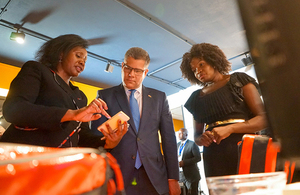UK aid boosts support for African women entrepreneurs to expand businesses into global markets
The UK is boosting support to female entrepreneurs in Africa, helping them overcome barriers to starting businesses and connecting them to global market

UK aid boosts support for African women entrepreneurs to expand businesses into global markets
• Women in Kenya, Nigeria and Ghana will have greater access to business and trade opportunities in global markets with UK support
• UK aid boost to programme will create up to 3,000 more jobs in female-run businesses
• Creating more opportunities for women to work and boost their income could add $12 trillion (or 11 per cent) to the value of the global economy by 2025
The UK is boosting support to female entrepreneurs in Africa, helping them overcome barriers to starting businesses and connecting them to global markets, International Development Secretary Alok Sharma announced today.
Africa has the highest concentration of female entrepreneurs, accounting for almost a third of all businesses on the continent.
Despite this, their contributions to the economy remains low. This is because many women face barriers to growing their businesses, such as obtaining investment from banks, with almost two thirds of women in Sub-Sahara Africa without bank accounts.
Through scaling up the successful SheTrades programme, the UK will empower women in Ghana, Nigeria and Kenya to grow their businesses and start trading internationally.
Today’s announcement will:
• Support female entrepreneurs to secure more investment through specialist business training, creating up to 3000 more jobs and helping to reduce inequality in the workplace;
• Create potential investment and development partnerships for women entrepreneurs;
• Work with governments in Ghana, Nigeria and Kenya to develop tailored gender-inclusive trade policies. Supporting women-owned businesses to participate in global trade helps drive economic growth and reduce poverty.
International Development Secretary Alok Sharma said:
“When women are economically empowered, their whole community benefits.
“Africa’s full potential can only be realised if the energy and ideas of the whole population are unleashed. She Trades is an important step towards achieving that.”
Enabling women to play an equal role in the economy is essential to sustained economic growth and will help lift millions out of poverty. Creating more opportunities for women to work could add $12 trillion (or 11 per cent) to the value of the global economy by 2025 and the McKinsey Global Institute report that reducing gender inequality will boost African economies by $316 billion over the coming years.
The UK-Africa Investment Summit will highlight the visibility of businesses run by women shaping the economies of African nations today. In countries where SheTrades is already working, it has generated over £18 million of revenue.
Leonie Badger, owner of Studio Badge supported by SheTrades, said:
“I have been able to connect with new and potential buyers from all over the world that helps me promote the beauty and uniqueness of Ghanaian art for my business Studio Badge.
“Beyond that I have received technical training and mentorship that has inspired me to dream big and gain even more confidence in my product. She Trades has been transformational for my business and I am grateful and excited for the future.”
Notes to Editors
The £3.5 million of UK aid announced today is for women’s economic empowerment to extend DFID’s SheTrades Commonwealth work. SheTrades is an initiative of the International Trade Centre (ITC), a joint agency of the United Nations and the World Trade Organization.
UK aid is building on the success of the SheTrades Commonwealth programme launched in 2018 after the Commonwealth Heads of Government Meeting (CHOGM), where over 2,800 women entrepreneurs have received skills-based training, tailored business advice and mentoring to help them manage and promote their businesses better.
The long-term economic benefits of supporting women and girls are clear - for every $1 invested in vital reproductive health services, $120 is invested back in economies around the world. UK aid is not only helping to increase access to family planning and safe healthcare for women and girls, the SheTrades programme commits to making women leaders in business across African nations.
The UK-Africa Investment Summit will bring together businesses, governments and international organisations to strengthen the partnership between the UK and Africa and help generate billions of pounds of opportunities for both British and African businesses. This investment will deliver jobs and growth. By creating more economic opportunities for Africa’s women, it will help more women to enter the workforce, become more financially independent, and help lift their communities out of poverty.
Case studies
Studio Badge by Leonie Badger
Studio Badge is a design and manufacturing home décor brand based in Accra, Ghana. The brand strives to not only make beautiful objects that spark joy, but to also transform the perception and profile of “Made in Africa” products by employing Ghanaian artisans and to highlight the uniqueness of Ghanaian wood. Through SheTrades, Studio Badge has received up to 18 wholesale orders from global buyers.
Botlab by Mercy Njue
Botlab is a software accelerator startup based in Nairobi that provides bespoke training to professionals in the fields of artificial intelligence, machine learning, and business intelligence. It also works to increase women’s participation in IT infrastructure and data science. Through SheTrades, Botlab has secured over $38,000 in overall trade leads and gained access to new markets, including in Uganda. They were also awarded the Most Outstanding Company at the East Africa Com Expo 2019.
General media queries (24 hours)
Email mediateam@dfid.gov.uk
Telephone 020 7023 0600
If you have an urgent media query, please email the DFID Media Team on mediateam@dfid.gov.uk in the first instance and we will respond as soon as possible.